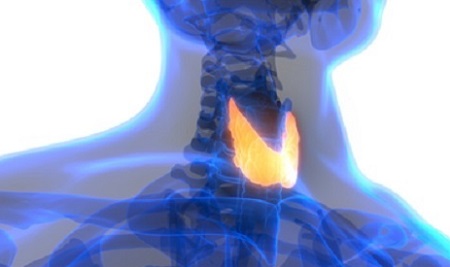Told You Have Prediabetes?


Your thyroid is a small, butterfly-shaped gland in the lower part of the neck. It produces hormones that control heart rate, blood pressure, metabolism and temperature. When you have thyroid disease, it can causes changes in these functions that trigger a wide range of disruptive symptoms.
According to the American Thyroid Association, more than 20 million Americans have thyroid disease, but many don't realize it.
Thyroid disease can be overlooked because many of its symptoms are similar to other conditions. However, doctors have several tools and techniques for diagnosing thyroid problems.
Physical examination - A physician can see and feel enlargement of the thyroid gland and/or nodules, even though they may not be apparent to you.
Laboratory blood tests - In addition to testing the level of thyroid hormones, such as TSH, T3 and T4, your doctor may test for antibodies that reveal the cause of your thyroid issues.
Imaging technology - An ultrasound of your thyroid can show growths on the gland, and other imaging techniques that use radioactive materials test the function of your thyroid.
When considering your treatment options, our comprehensive endocrinology team considers your particular thyroid condition as well as your age, general health and past medical issues.
Thyroid diseases are usually lifelong conditions. At UM Center for Diabetes and Endocrinology (UM CDE), our endocrinologists help people manage thyroid disease and live healthy lives.
To make an appointment with one of our specialists, call 443-682-6800.
When the thyroid produces too much hormone, it is called hyperthyroidism. When the thyroid produces too little, it is called hypothyroidism.
In addition to problems related to the production of thyroid hormone, other thyroid conditions involve masses or nodules on the thyroid that may be benign or cancerous. These may trigger hypothyroidism or hyperthyroidism.
This condition, in which the thyroid does not make enough thyroid hormone, is diagnosed by a physical exam of the thyroid gland and blood tests.
Though the cause of hypothyroidism varies, its treatment is the same. It is controlled with medication that replaces the missing hormones.
Hypothyroidism symptoms can include:
Hashimoto's is the most common cause of hypothyroidism. In this autoimmune condition, the body produces antibodies that attack the thyroid, and the resulting inflammation (thyroiditis) damages the thyroid's ability to produce the needed hormones.
A variety of other conditions can slow the production of thyroid hormone, including:
When the thyroid produces too much hormone, it is called hyperthyroidism. Doctors diagnose hyperthyroidism by a physical examination that usually reveals an enlarged thyroid gland and fast pulse. They will then perform a couple of blood tests and scans of your thyroid gland.
Hyperthyroidism symptoms can include:
Graves' disease, the most common cause hyperthyroidism, is an autoimmune disease. The body produces antibodies that overstimulate the thyroid causing it to produce too much of the thyroid hormones.
Other causes include thyroid nodules on the gland that are overproducing hormones and inflammation of the thyroid (thyroiditis) that causes the hormones to leak into the bloodstream.
Unlike hypothyroidism, where treatment is straightforward replacement of missing hormones, hyperthyroidism treatment is much more complex.
Treatment options for hyperthyroidism will depend on your age, the severity and type of hyperthyroidism, other medical conditions and your personal preference.
At UM Center for Diabetes and Endocrinology, our endocrinologists will help you evaluate the benefits and drawbacks each type of treatment.
These may include:
A goiter, the abnormal enlargement of the thyroid gland, indicates there is an underlying condition causing the thyroid to grow abnormally. It can occur when the thyroid gland is producing too much, too little or the correct amount of hormone.
Symptoms may include:
Depending on the size of the goiter, a physician may be able to diagnose just by a physical exam. Other diagnostic tests include blood tests, radioactive iodine scan and thyroid ultrasound.
Treatment depends on the cause of the goiter.
A thyroid nodule is an abnormal lump on the thyroid gland. It can be solid or fluid-filled. The vast majority (about 95 percent) are not cancerous.
Most thyroid nodules do not show any symptoms and are often discovered by accident during a routine physical exam or CT scan. However. they do need to be evaluated to be sure they are not cancerous.
Nodules are diagnosed by thyroid ultrasound, which uses high-frequency sound waves to take a picture of the thyroid. And a fine needle biopsy is often done to check for cancer. In this procedure, the doctor inserts a needle into your neck and exacts cells to be examined for cancer. It is done in your doctor's office and takes about 20 minutes.
Papillary and follicular thyroid cancers, which are 95 percent of the thyroid cancers diagnosed, are also the most curable. Typically they are treated with the removal of the lobe of the thyroid gland where the cancer is or the entire thyroid gland.
If a thyroid nodule is cancerous, the experts at UM CDE will work closely with our colleagues at UM Greenebaum Comprehensive Cancer Center to help determine your best treatment options. Risk factors for thyroid cancer include:
